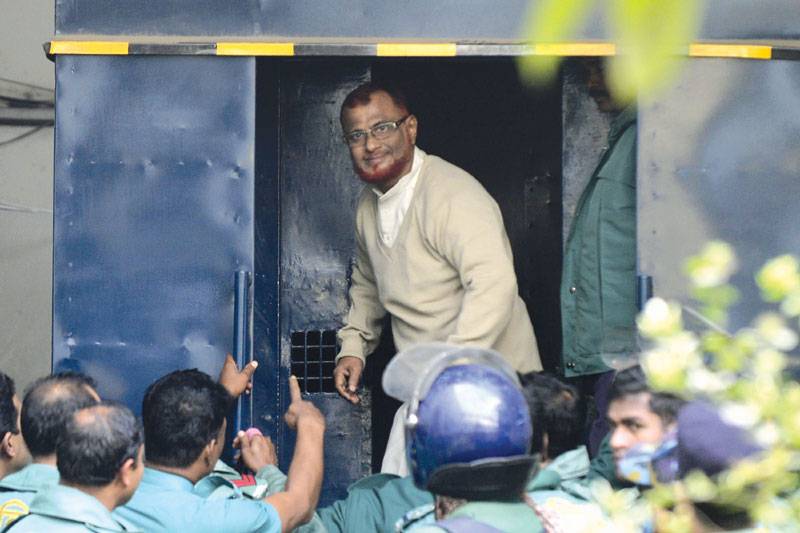DHAKA - Bangladesh’s war crimes court Tuesday sentenced a Jamaat-e Islami leader to death for alleged rape, mass murder and genocide during the 1971 war.
ATM Azharul Islam became the 16th person and the 11th JI leader to be convicted of atrocities by the International Crimes Tribunal, which found him guilty of being a key member of a pro-Pakistan militia.
The 62-year-old is the assistant secretary general of the nation’s largest Islamic party, the Jamaat-e Islami. “I am innocent!” he shouted as the presiding judge Enayetur Rahim ordered him to be “hanged by the neck” for the genocide of more than 1,200 people in a flood plain in the northern district of Rangpur. “No doubt, it was mass murder,” Judge Rahim told a packed court, which was blanketed by tight security.
Prime Minister Sheikh Hasina created the controversial tribunal, a domestic court with no international or United Nations oversight, in 2010. It has mostly focused on the trials of the Jamaat leaders who opposed the break-up of Pakistan and saw the liberation war by Bengalis as a conspiracy by majority-Hindu India.
The tribunal has also sentenced to death a former minister of the main opposition Bangladesh Nationalist Party. Secular protesters staged impromptu “victory” marches in the capital Dhaka and in Rangpur to hail the latest verdict. But defence lawyer Tajul Islam rejected the charges against Islam and said his team planned to appeal the verdict in the Supreme Court.
“Azharul Islam was a 19-year-old student during the war and in no way was involved in war crime. The charges against him are false and fabricated,” the lawyer said.
Jamaat condemned the verdict, saying Islam did not get justice. “Islam is a victim of the government’s continued conspiracy to murder the Jamaat leadership,” acting party chief Maqbul Ahmed said in a statement, accusing the government of “arranging false witness statements by its party people”.
Jamaat also called a nationwide strike for Wednesday and Thursday. Previous death sentences handed down against Jamaat leaders, including its supreme and spiritual leaders, plunged Bangladesh into its deadliest unrest last year.
Thousands of Islamists clashed with police in nationwide protests over the verdicts and other issues and some 500 people were killed. The BNP and Jamaat have called the trials politically motivated, aimed at eliminating opposition leaders rather than rendering justice. Rights groups have said they fall short of international standards.
The government maintains they are needed to heal the wounds of the war, which it says left three million people dead. Independent researchers put the toll much lower.
Friday, April 19, 2024
Top B’desh JI leader sentenced to hang

8:27 AM | April 19, 2024
8:09 AM | April 19, 2024
No damage to Iranian nuclear sites after Israeli airstrikes, says UN nuclear watchdog
12:50 PM | April 19, 2024
Ch Shafay visits Directorate of Consumer Protection Council
April 19, 2024
ECP reviews arrangements for by-elections in Punjab
April 19, 2024
Punjab’s price control initiative: A welcome step
12:33 PM | April 19, 2024
A Tense Neighbourhood
April 19, 2024
Dubai Underwater
April 19, 2024
X Debate Continues
April 19, 2024
Hepatitis Challenge
April 18, 2024
IMF Predictions
April 18, 2024
Kite tragedy
April 19, 2024
Discipline dilemma
April 19, 2024
Urgent plea
April 19, 2024
Justice denied
April 18, 2024
AI dilemmas unveiled
April 18, 2024
ePaper - Nawaiwaqt
Advertisement
Nawaiwaqt Group | Copyright © 2024





